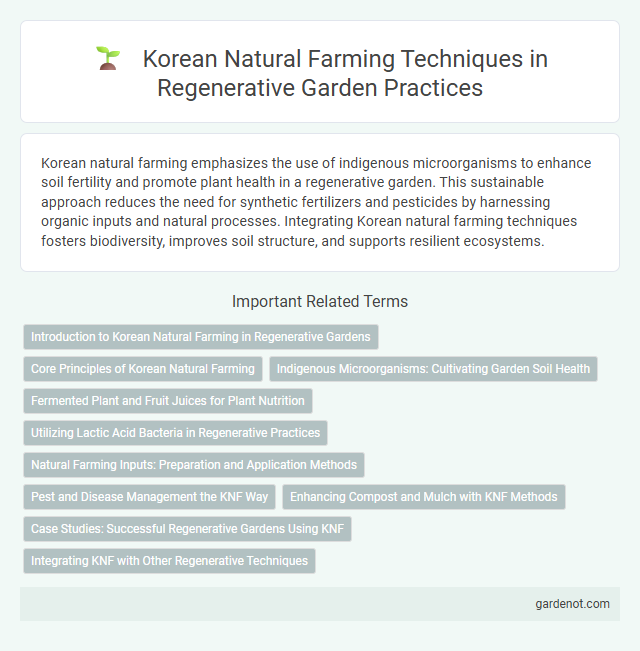Korean natural farming emphasizes the use of indigenous microorganisms to enhance soil fertility and promote plant health in a regenerative garden. This sustainable approach reduces the need for synthetic fertilizers and pesticides by harnessing organic inputs and natural processes. Integrating Korean natural farming techniques fosters biodiversity, improves soil structure, and supports resilient ecosystems.
Introduction to Korean Natural Farming in Regenerative Gardens
Korean Natural Farming (KNF) emphasizes using indigenous microorganisms (IMOs) to enhance soil fertility and plant health in regenerative gardens. This sustainable farming method reduces chemical inputs by promoting natural nutrient cycles and improving soil biology. Employing KNF techniques results in resilient ecosystems that support diverse plant growth and increased carbon sequestration.
Core Principles of Korean Natural Farming
Korean natural farming emphasizes the use of indigenous microorganisms (IMO) to enhance soil fertility and plant health, reducing dependency on synthetic inputs. Core principles include promoting biodiversity, recycling organic matter, and fostering symbiotic relationships between plants and microbes to create a self-sustaining ecosystem. This approach supports regenerative garden practices by improving soil structure, nutrient cycling, and overall ecosystem resilience.
Indigenous Microorganisms: Cultivating Garden Soil Health
Korean natural farming emphasizes the cultivation of Indigenous Microorganisms (IMOs) to enhance garden soil health by promoting nutrient cycling and improving soil structure. These native microbes break down organic matter efficiently, fostering a balanced ecosystem that supports plant growth and resilience. Incorporating IMOs into regenerative garden practices leads to sustainable soil fertility with reduced reliance on chemical fertilizers.
Fermented Plant and Fruit Juices for Plant Nutrition
Fermented Plant and Fruit Juices (FPJ) are a cornerstone of Korean natural farming, harnessing naturally occurring microorganisms to enhance soil fertility and plant vitality. These nutrient-rich extracts, made by fermenting local fruits or plants with brown sugar, provide essential enzymes, minerals, and vitamins that promote robust growth and resilience against pests. Integrating FPJ into regenerative gardens boosts microbial diversity and soil health, leading to sustainable, chemical-free plant nutrition and improved crop yields.
Utilizing Lactic Acid Bacteria in Regenerative Practices
Utilizing lactic acid bacteria in Korean natural farming enhances soil fertility by promoting beneficial microbial activity and suppressing harmful pathogens. This biological approach supports regenerative garden practices by improving nutrient cycling and increasing plant resilience to pests and diseases. Integrating lactic acid bacteria applications aligns with sustainable agriculture goals, fostering healthier ecosystems and reducing reliance on chemical inputs.
Natural Farming Inputs: Preparation and Application Methods
Korean natural farming emphasizes the use of indigenous microorganisms (IMOs) as natural farming inputs, prepared by cultivating beneficial microbes from local forest or soil environments. These inputs are created through fermentation processes using materials such as rice bran, brown sugar, and various plant extracts to enhance soil fertility and plant health. Application involves spraying or mixing these fermented solutions into the soil or onto crops, promoting nutrient cycling, pest resistance, and sustainable growth in regenerative gardens.
Pest and Disease Management the KNF Way
Korean Natural Farming (KNF) emphasizes using indigenous microorganisms and fermented plant extracts to enhance soil health and activate natural pest resistance, reducing reliance on chemical pesticides. Pest and disease management in KNF relies on creating a balanced ecosystem by promoting beneficial insects and applying botanical pesticides derived from locally sourced materials like garlic, chili, and ginger. This sustainable approach not only mitigates harmful pest infestations but also strengthens plant immunity, resulting in healthier, more resilient regenerative gardens.
Enhancing Compost and Mulch with KNF Methods
Korean Natural Farming (KNF) techniques enhance compost and mulch by accelerating microbial activity using indigenous microorganisms (IMO) and fermented plant juices, which improve soil fertility and structure. KNF methods enrich organic matter decomposition, resulting in nutrient-rich, biologically active compost that boosts plant growth and resilience. Applying KNF-based compost and mulch supports sustainable soil regeneration by increasing moisture retention, suppressing weeds, and fostering beneficial soil fauna.
Case Studies: Successful Regenerative Gardens Using KNF
Case studies of regenerative gardens using Korean Natural Farming (KNF) demonstrate significant improvements in soil fertility, crop yields, and ecosystem resilience by utilizing indigenous microorganisms and natural inputs. Gardens employing KNF techniques showcase reduced dependence on synthetic fertilizers, enhanced water retention, and increased biodiversity, contributing to sustainable agriculture practices. Successful examples from South Korea and international farms highlight the effectiveness of KNF in creating self-sustaining regenerative garden systems.
Integrating KNF with Other Regenerative Techniques
Integrating Korean Natural Farming (KNF) with other regenerative garden techniques enhances soil fertility and ecosystem resilience by combining Indigenous microbial inoculants with composting and biochar applications. Utilizing KNF's indigenous microorganisms alongside permaculture design promotes nutrient cycling and water retention, leading to healthier plant growth and reduced chemical inputs. This synergy fosters a sustainable, biodiverse garden system that supports long-term regeneration of soil health and productivity.
Korean natural farming Infographic

 gardenot.com
gardenot.com